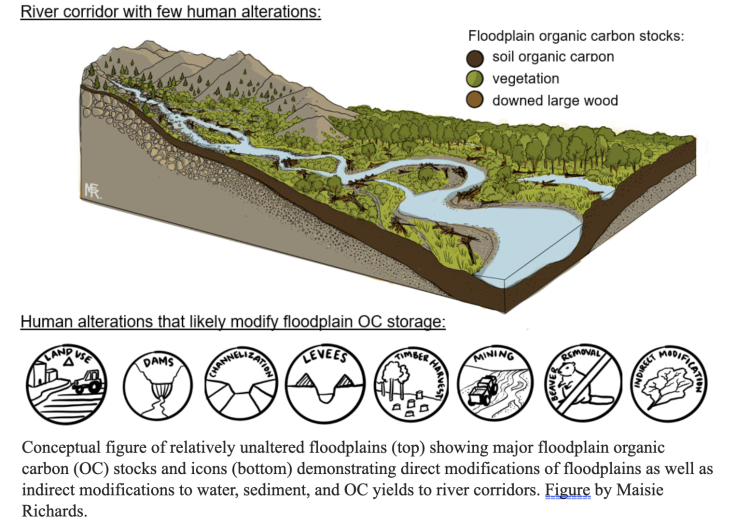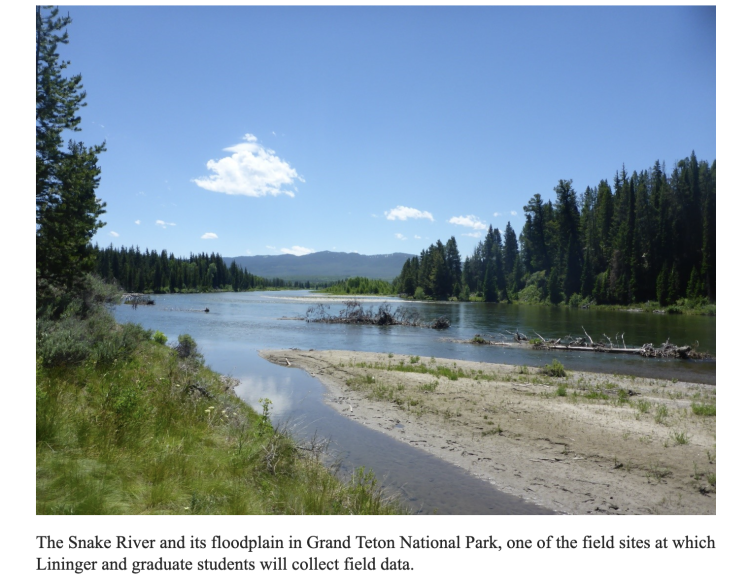 Assistant Professor Katherine Lininger has received an NSF Career Award for her project titled, "Rivers of Carbon: assessing how humans have altered floodplain organic carbon stocks across the contiguous United States.” The Faculty Early Career Development (CAREER) Program is a Foundation-wide activity that offers the National Science Foundation's most prestigious awards in support of early-career faculty who have the potential to serve as academic role models in research and education and to lead advances in the mission of their department or organization. Activities pursued by early-career faculty should build a firm foundation for a lifetime of leadership in integrating education and research.
Assistant Professor Katherine Lininger has received an NSF Career Award for her project titled, "Rivers of Carbon: assessing how humans have altered floodplain organic carbon stocks across the contiguous United States.” The Faculty Early Career Development (CAREER) Program is a Foundation-wide activity that offers the National Science Foundation's most prestigious awards in support of early-career faculty who have the potential to serve as academic role models in research and education and to lead advances in the mission of their department or organization. Activities pursued by early-career faculty should build a firm foundation for a lifetime of leadership in integrating education and research.
Lininger’s project will determine how much organic carbon is stored in river floodplains in soil, vegetation, and downed wood across the United States. It will assess how human activities such as levees, dams, and land use change have changed carbon storage in floodplains (Figure 1). Floodplains store large amounts of carbon, but there are no US-scale estimates of how much carbon floodplains store or how human activities have changed carbon storage. The negative impacts of climate change on the environment and on humans motivate an interest in removing carbon from the atmosphere. Floodplains could store more carbon, but we do not adequately understand the potential for increasing carbon storage through changing how floodplains are managed.
Through work on the 5-year CAREER award, Lininger will 1) compare floodplain carbon storage in human modified and unmodified floodplains in understudied regions of the USA through extensive fieldwork, 2) use field-based estimates of floodplain carbon storage to determine whether it is accurate to use publicly available geospatial datasets to estimate floodplain carbon storage, 3) determine how much carbon is stored in floodplains across the USA and the potential storage if human modifications (for example, levees, dams, and land use change) were reduced, and 4) create course modules for high school, undergraduate, and graduate students and create outreach materials through collaborations with non-profit organizations. The project will also support training graduate students in communicating science to policy makers and management agencies through interactions with non-profit organizations. Lininger hopes to build the science of floodplain carbon storage to bring information to managers so that it can be considered in river and floodplain management activities. The work will also help determine the locations in the USA and within watersheds where maximum floodplain carbon storage occurs.


